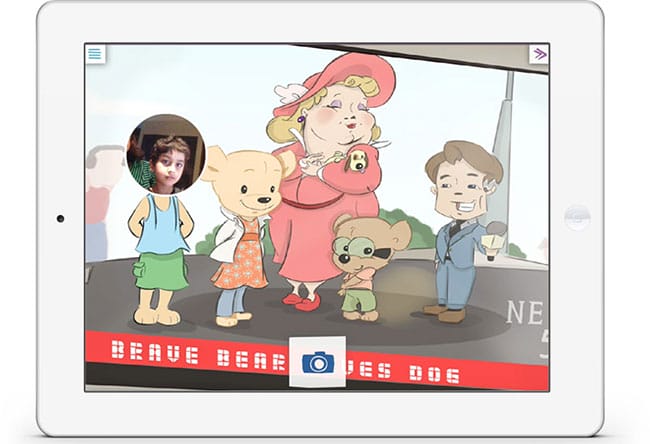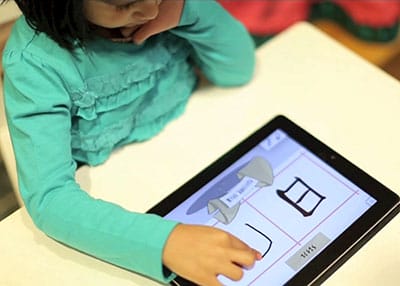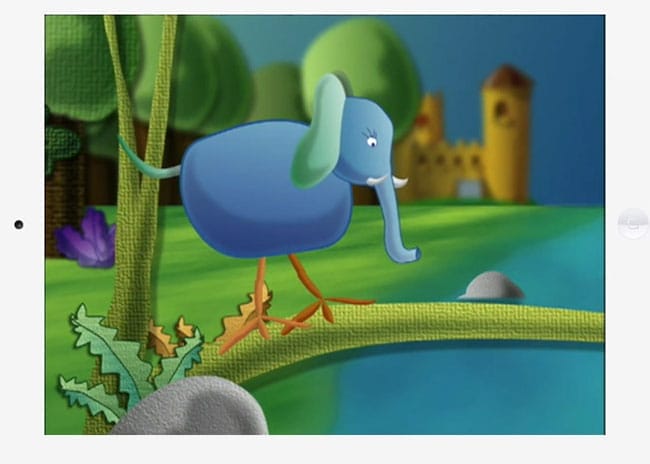One of the tricks of being a parent is getting children to willingly indulge in something that is good for them. Think meatballs stuffed secretly with vegetables. One of the tricks of being a technologist is designing a device or software that matches how users will actually want to use it, so that they will want to use it more and more. Think a music streaming app sprinkled with advertising. The secret to being a technologist and a parent who is designing something for users like your kids … well, that is a challenge that Prasanna Krishnan, WG’07, has dared to tackle.

Prasanna Krishnan
Krishnan launched SmartyPal, a novel iPad app for young children that allows users to become a part of their favorite stories, all while they play games and enjoy other activities that help them build valuable developmental skills.
“You’re learning without realizing that you’re learning,” Krishnan says.
All three co-founders (Krishnan, her husband and Wharton Professor Kartik Hosanagar, and Lakshmi Sudarsan) are parents and saw a need for SmartyPal from their own parenting experience.
The app’s secret power (secret at least to the preschoolers playing) comes from a cloud-based, adaptive learning engine. Hosanagar has looked at the significant impact that personalization of digital content and marketing has on traffic and sales (such as when Amazon tells you what other people who bought your item also bought). SmartyPal applies it in the educational space. What makes SmartyPal special in that regard is that usually such technology is reserved for high school and college age students, not preschoolers.
During stories in the app, games and activities appear that entertain, yes, but also move the plot along. The engine records how the children performed, what they did well at, what they didn’t, and then adjusts the content the next time users return. Stories are thus never the same, and the activities can get more challenging and move young minds on to practice other skills.
In “Lollybird’s Tale of Being Different” (created by So Smart! co-founders Scott Tornek, C’87, WG’95, and Alex Tornek, C’90)—a story that teaches kids about dealing with differences— Lollybird doesn’t fit in because she’s the only elephant with bird legs. But the SmartyPal users can help make a bridge that only Lollybird can cross (because of her special bird legs), advancing the story and saving the leader of the elephants. Another creative activity in Lollybird’s story involves building your own special animal, grafting an owl’s head here, an elephant’s rear there. In another story, children help the protagonist, a flea, complete his arithmetic—the calculations growing more difficult with the more aptitude children show.
SmartyPal launched with a pilot story in 2013, and the app scored engagement metrics (like sessions per week and 30-day retention) that were two to three times higher than the typical children’s game, Krishnan says.

Take a picture with Zylie the Bear, created by Mary Beth Minton, WG’82.
If that doesn’t validate SmartyPal’s adaptive learning engine, a $150,000 grant from the National Science Foundation certainly does. The NSF money serves as string-free funding, helpful at a time when SmartyPal is still bootstrapped. Krishnan and co-founder Sudarsan, a friend from college, caught the startup bug and the urge to apply what they knew for positive social value.
In Krishnan’s case, she has been a technologist from every angle. She worked at Microsoft before her Wharton MBA, designing WinFS, a data storage system that never made it to market (though something Bill Gates once publicly said was his favorite product that Microsoft never pursued). After Wharton, she was a Silicon Valley venture capitalist at Draper Fisher Jurvetson with education and cloud computing as her focus. Then she worked at Comcast, moving east in 2009 after Hosanagar earned his Wharton tenure. After her corporate tech stint, Krishnan went startup, running the travel planning product Jetsetter.com until 2012.
Then enter her 4-year-old and that urge to create positive social value. She knows how children are drawn to mobile devices like, well, children to any sort of devices. And like most parents, she has a concern about “screen time.”

SmartyPal users progress to helping Zylie the Bear write Chinese characters.
“As a technologist, I know it’s about how you use the technology,” she says.
Hence, why SmartyPal has made educational content a priority. SmartyPal tackled the educational part of that equation with the adaptive learning engine and by bringing on board as advisers two nationally recognized researchers in early childhood development, Temple University’s Kathy Hirsh-Pasek, GR’81, and Delaware’s Roberta Golinkoff.
For the content component, Krishnan connected with Penn alumni. Soon after the success of the pilot, Krishnan began outreach to content owners, offering up SmartyPal as a mobile platform on which they could quickly share stories. Creators bring their stories, and the SmartyPal team work closely with them to tailor it to the platform, including designing the educational activities to go along with it. As mentioned, the Torneks have come on board with stories like Lollybird’s. So has Zylie the Bear creator, Mary Beth Minton, WG’82, with Zylie’s Adventures in NYC, China and Australia, and children’s author Ashley Foxx, C’05, with her stories about mischievous Keisha Cane.
Next steps include a pilot program with preschools, as well as potential partnerships with content owners, including content distributed on well-known kids’ TV channels. And of course promotion—such as the recent article in Technical.ly Philly and an appearance on SiriusXM Business Radio Powered by the Wharton School (on the Launchpad show co-hosted by Vice Dean of Innovation and CIBC Endowed Professor Karl Ulrich.)
And beyond that … continuing to get more and more tots to learn on the app, without even knowing it.

























